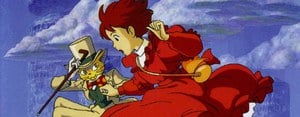Review
by Andrew Osmond,Whisper of the Heart
| Synopsis: |  |
||
Shizuku is an imaginative middle-school girl, living with her family in a Tokyo suburb. She loves reading and inventing stories, and is intrigued by a male name that keeps turning up on the library cards of the books she borrows. Following a stray cat, she finds a lovely antique shop, where a dapper cat doll (“The Baron”) intrigues her further. Meanwhile, a strange schoolboy delights in aggravating her. All these things are connected, in ways Shizuku could never guess… |
|||
| Review: | |||
Whisper was meant as a new start, Ghibli's first cinema film not directed by either of its star auteurs, Hayao Miyazaki or Isao Takahata. Shortly before Whisper, Miyazaki told the U.S. magazine Animerica, “I'd like to retire before someone suggests it to me.” He storyboarded Whisper, but handed its direction to Yoshifumi Kondō. An animator and designer, Kondo was a veteran with decades of experience, unlike any of the “new” Ghibli directors since (Hiroyuki Morita, Goro Miyazaki and Arrietty's Hiromasa Yonebayashi.) Miyazaki himself called Kondo, “One of the best among the hundreds of animators I ever met.” Kondo's early death in 1998, like Satoshi Kon's passing in 2010, closed off one of anime's brightest futures. The film starts with schoolgirl Shizuku greeting a sunny morning over her town, before being she's drawn, Alice-like, along a paper-trail of small strange things. First there's an indifferent fat cat on a train who leads Shizuku on a merry chase up hill, over fence and through alley to an antique shop. The shop holds an array of gorgeous things, most enchantingly an emerald-eyed cat doll called the Baron that seems to reflect and transform the customer's melancholia (and at fourteen, Shizuku is learning about melancholy). The doll also has a special meaning for the shop's aged owner, who in turn is linked unexpectedly to… ah, but that'd be telling. The film's point is that nothing is small or commonplace if you see it through the right eyes; the eyes of an imaginative young girl, or those of a Ghibli artist drawing her world in exquisite detail. The minor and mundane in Whisper become starting points for wondrous stories. When the girl sees the cat taking the train, her reaction isn't to cry “Cute!”; rather it's to ask the cat (whom she politely calls “Neko-kun”) where he's going. That the cat doesn't answer doesn't discourage her; rather, it deepens the mystery and inspires her to follow. In his written film proposal (reprinted in the book Starting Point), Miyazaki explained that Whisper was aimed at viewers who “tend to give up too easily on the idea of being the star of their own stories.” The boy whom Shizuku encounters is functional in plot terms, but shows a wicked sense of humour early on, needling Shizuku about her poetry and lunch bag (though Shizuku's maddened reactions to him are funnier). His halting eloquence later is charming, which is lucky for him, as some of his behaviour could be construed as stalking! Although Whisper comes from a girls' manga by Aoi Hiiragi, the love scenes smack of monochrome Hollywood romance, even when played by Japanese schoolkids making heartfelt confessions on a rainy school roof. To quote Miyazaki's proposal again: “As Chaplin's films demonstrated, simply meeting a member of the opposite sex can be an uplifiting experience.” The most real people in Whisper, though, are the support cast. One of Whisper's charms is their ordinary lives are hinted to be quite as interesting as Shizuku's (and as deserving of their own films). There's Shizuku's adult sister, who sleeps in the bunk over hers in their small apartment and is believably irritated by her bratty kid sister. Their mother is a mature student who's plainly given Shizuku her independent streak. Shizuku's closest schoolmates are a girl and a boy, playing through a drama we only half-see (look for their return during the end credits). The film's men, Shizuku's dad and the antique shop owner, blend into one kindly teaching figure, responding to a girl with a budding heart and spirit. The Blu-ray splendidly displays Whisper's hyperreal detail, perhaps unmatched in any other Ghibli film. It's in the cosy clutter of Shizuku's flat; in the play of sunbeams at dawn, noon and twilight; in the panoramic Tokyo landscapes seen from the terraced slopes of Tama Hills (Whisper's real setting); and in the string-plucking fingers of a bit-part band of musicians, who turn up for a single scene to accompany Shizuku through an impromptu performance of “Country Road.” For anyone wanting proof of how the Blu-ray picture improves on the already-available Whisper DVD, look at the last scene, which includes a shot of Tokyo in the dawn mist. The highrise buildings have tiny red aircraft-warning lights, barely visible on the DVD, but standing out clearly on Blu-ray. The extras are largely about the artist Naohisa Inoue, who painted the bogglingly intricate, bejewelled fantasy landscapes in Whisper's brief dream scenes. There's a slideshow of his background art, which would be much easier to appreciate in a book. A “Four Masterpieces” feature shows how Inoue's paintings are constructed through dozens of impressionist layers, but you wish the artist was on hand to talk through his creations. There's a standard-order “Behind the Microphone” featurette on the dub cast; it includes British actor Cary Elwes, who reprises his role as the cat-doll “The Baron,” having already played the character in Disney's dub of Ghibli's later film, The Cat Returns. The Blu-ray also includes Whisper's Japanese cinema trailer and TV spots. |
|
The views and opinions expressed in this article are solely those of the author(s) and do not necessarily represent the views of Anime News Network, its employees, owners, or sponsors.
|
| Grade: | |||
Overall : A
Overall (sub) : A
Story : A
Animation : A
Art : A+
Music : A
+ A resplendent transfer of a timeless anime classic. |
|||
|
discuss this in the forum (4 posts) |
this article has been modified since it was originally posted; see change history |
|||
| Production Info: | ||
|
Full encyclopedia details about |
||
 Viewed one way,
Viewed one way,